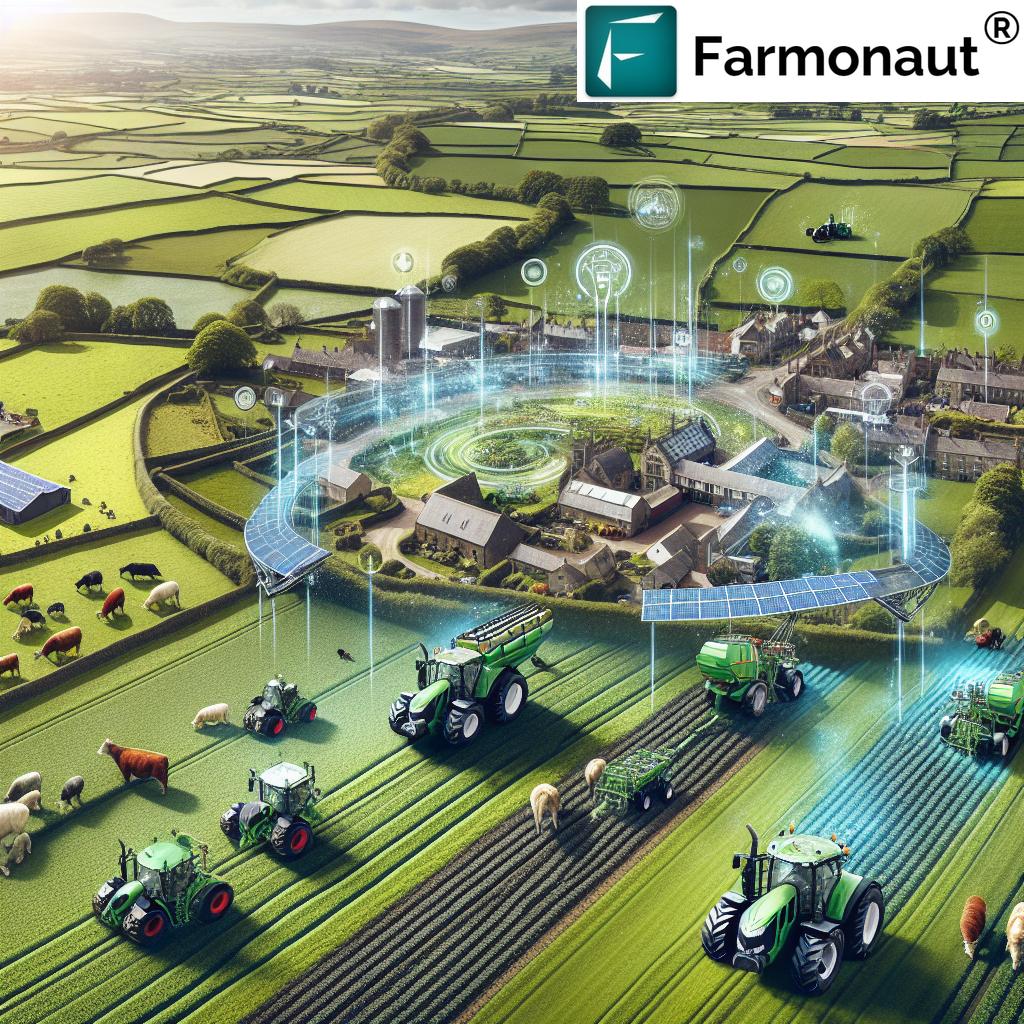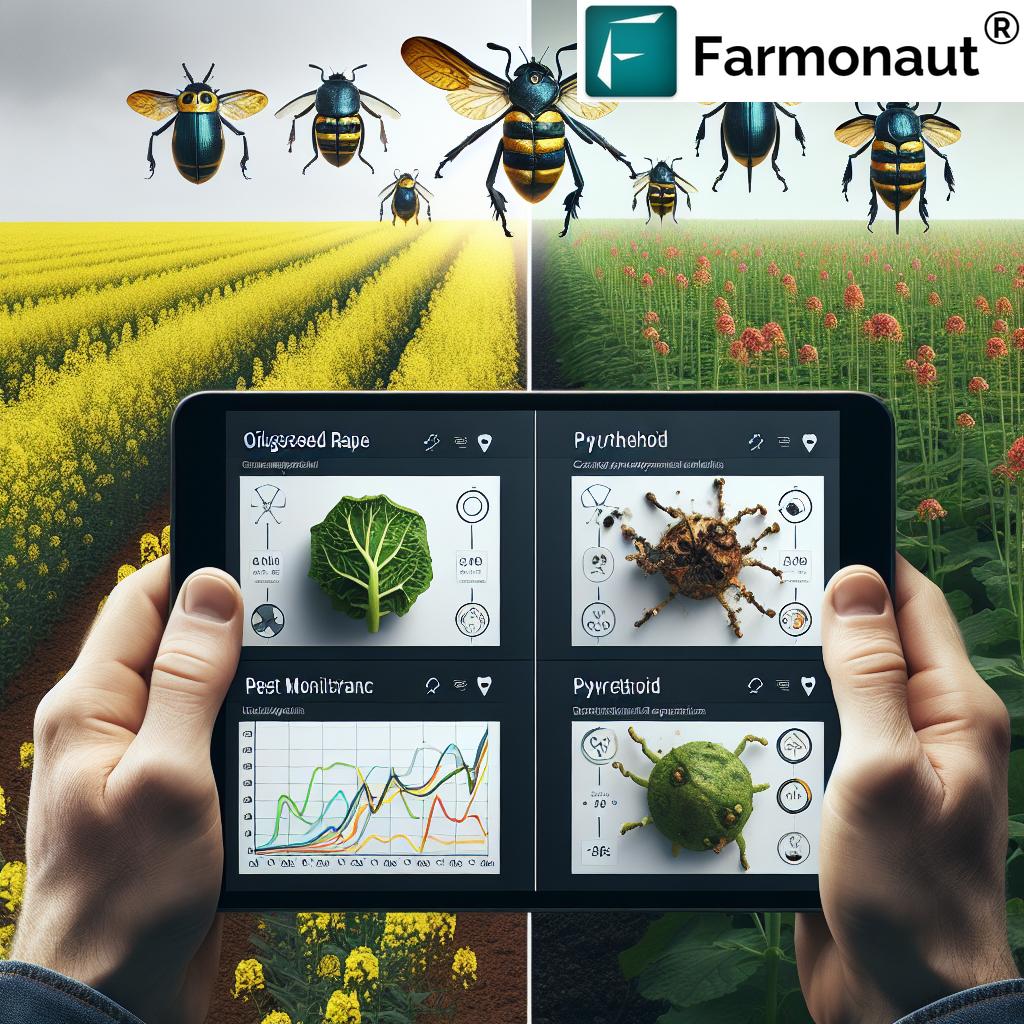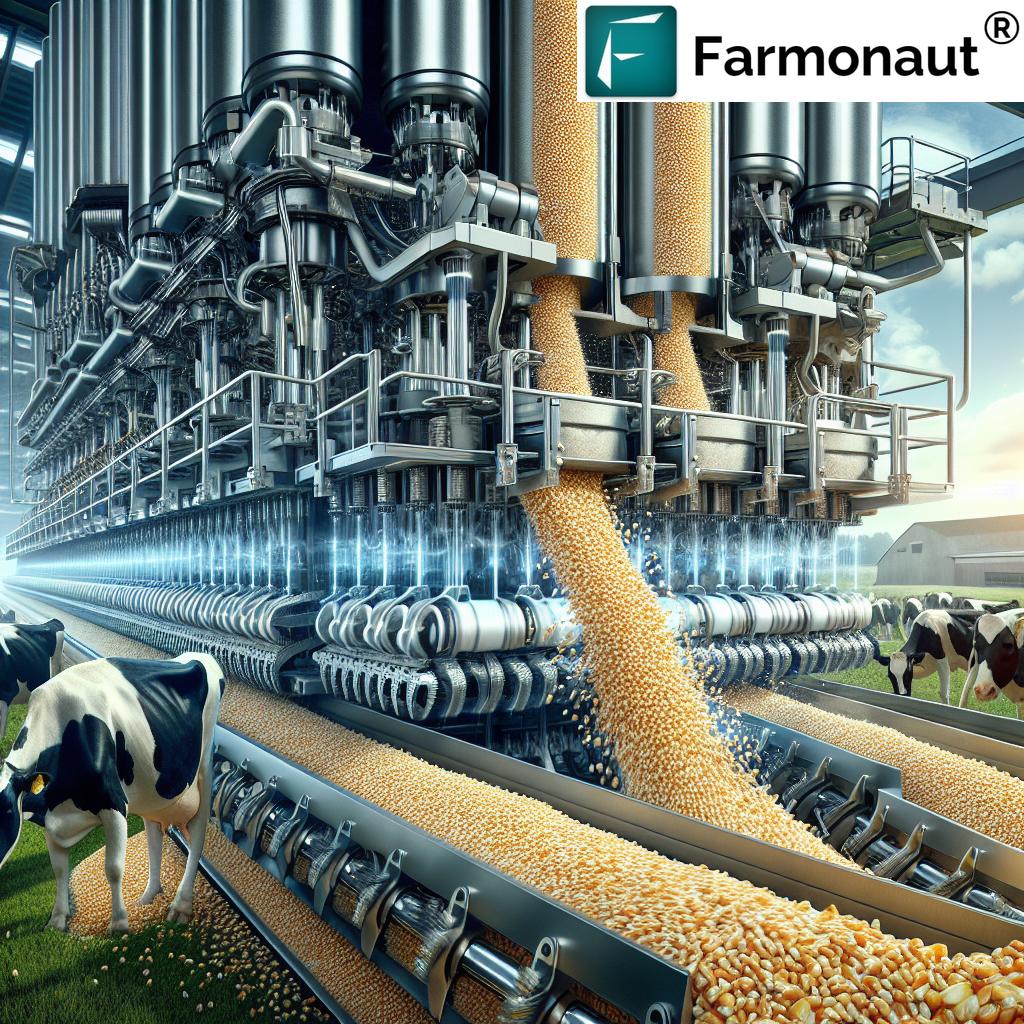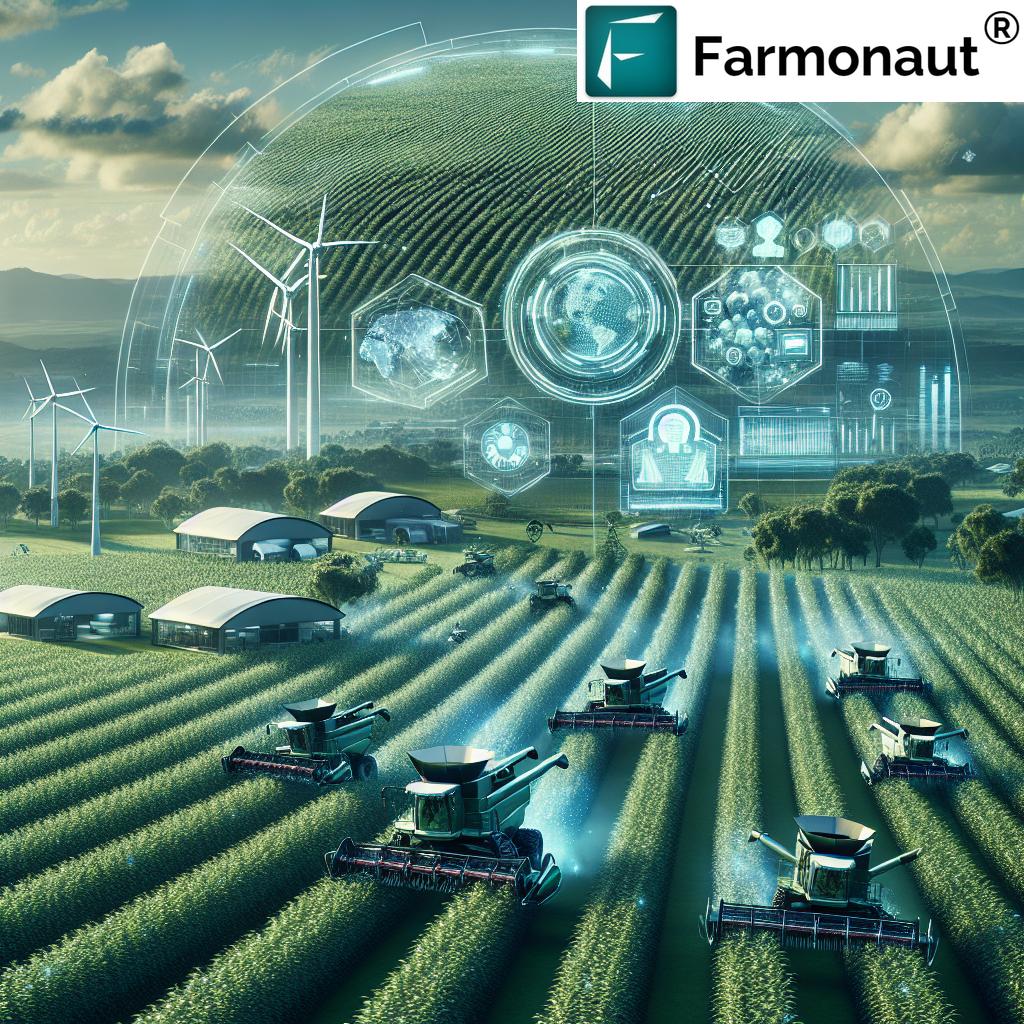Revolutionizing Northumberland Farms: Sustainable Manure Management for Improved Soil Health and Crop Yields
“Sustainable manure management reduces composting time from 2 years to just 10-12 weeks, a 90% decrease in processing duration.”
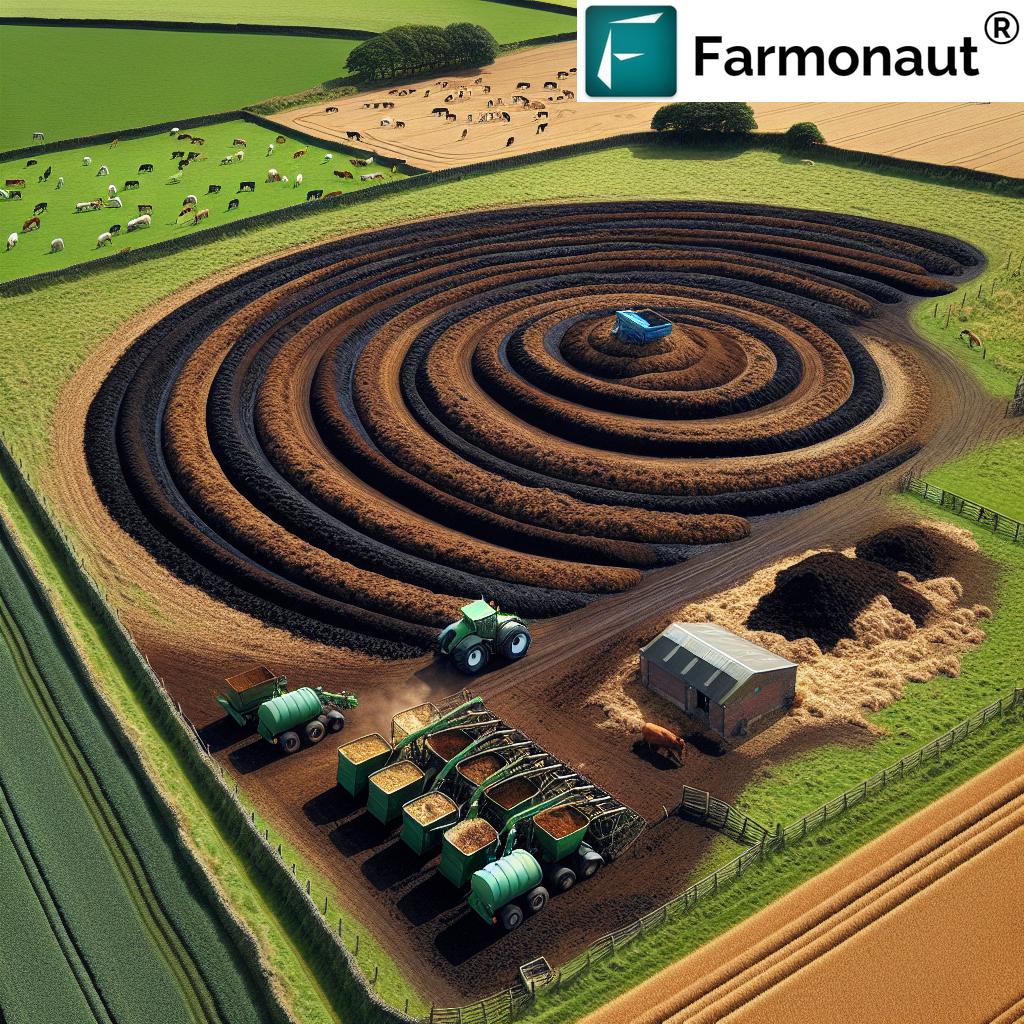
In the rolling hills of Northumberland, a quiet revolution is taking place. We’re witnessing a transformation in farming practices that’s not only boosting crop yields but also nurturing the very foundation of agriculture – our soil. At the heart of this change is sustainable manure management, a practice that’s reshaping how we think about farm waste and soil health.
As we delve into this topic, we’ll explore how innovative techniques like windrow turning technology are accelerating the production of nutrient-rich compost, drastically reducing the time it takes to turn raw manure into a valuable resource for soil health improvement. We’ll also examine how these practices are helping farmers reduce their reliance on artificial fertilizers, leading to more sustainable and environmentally friendly farming methods.
The Power of Sustainable Manure Management
Sustainable manure management is more than just a buzzword; it’s a game-changer for modern agriculture. By implementing efficient composting techniques, farmers are able to transform raw manure into high-quality organic fertilizer in a fraction of the time it used to take. This process not only improves soil structure and fertility but also helps in reducing the environmental impact of farming operations.
- Accelerated composting process
- Enhanced nutrient retention
- Reduced reliance on artificial fertilizers
- Improved soil structure and water retention
One of the key technologies driving this change is windrow turning. This innovative approach to composting involves creating long rows of organic material, which are periodically turned and aerated. The result? A dramatic reduction in composting time from the traditional two-year process to just 10-12 weeks.
Integrating Livestock and Arable Systems
The integration of livestock with arable cropping systems is a cornerstone of sustainable farming practices. This approach, often referred to as mixed farming, offers numerous benefits:
- Natural fertilization of fields
- Improved soil organic matter content
- Enhanced biodiversity on farms
- Reduced need for external inputs
By combining livestock and crop production, farmers in Northumberland are creating closed-loop systems where the waste from one part of the farm becomes a valuable input for another. This not only reduces costs but also promotes a more resilient and sustainable farming model.
The Science Behind Windrow Turning
Windrow turning is a scientific process that optimizes the conditions for microbial activity, which is essential for effective composting. Here’s how it works:
- Raw manure and other organic materials are arranged in long rows (windrows).
- Specialized machinery turns these windrows regularly, introducing oxygen.
- The aeration promotes aerobic decomposition, which is faster and produces less odor.
- Temperature and moisture levels are carefully monitored and managed.
- The process is repeated until the compost reaches the desired quality.
This method not only speeds up the composting process but also ensures a more consistent and high-quality end product. The resulting compost is rich in nutrients and beneficial microorganisms, making it an excellent soil amendment for crop production.
Benefits of Sustainable Manure Management
The adoption of sustainable manure management practices offers a wide range of benefits for farmers, crops, and the environment:
- Improved Soil Health: The addition of high-quality compost enhances soil structure, water retention, and nutrient availability.
- Reduced Environmental Impact: By minimizing the use of artificial fertilizers, farmers can decrease their carbon footprint and reduce nutrient runoff.
- Cost Savings: Over time, the reduced need for purchased fertilizers can lead to significant cost savings for farms.
- Increased Crop Yields: Healthier soils typically result in better crop performance and higher yields.
- Enhanced Farm Resilience: Improved soil health helps crops better withstand environmental stresses like drought or heavy rainfall.
“Windrow turning technology accelerates decomposition, potentially improving crop yields and reducing artificial fertilizer use by up to 50%.”

Implementing Sustainable Manure Management on Your Farm
For farmers looking to implement sustainable manure management practices, here are some key steps to consider:
- Assess Your Current Situation: Evaluate your farm’s manure production, storage capacity, and land application needs.
- Plan Your Composting System: Design a composting area that allows for efficient windrow creation and turning.
- Invest in Appropriate Machinery: Consider purchasing or renting windrow turning equipment.
- Monitor and Adjust: Regularly check compost temperature, moisture, and quality, adjusting your process as needed.
- Integrate with Crop Production: Plan how you’ll use the finished compost in your crop rotation and fertilization strategy.
It’s important to note that while the initial setup may require some investment, the long-term benefits often far outweigh the costs.
The Role of Technology in Sustainable Farming
As we embrace sustainable manure management, technology plays a crucial role in optimizing these practices. Farmonaut, a leading agricultural technology company, offers innovative solutions that can help farmers maximize the benefits of their sustainable farming efforts.
Through advanced satellite-based crop monitoring and AI-driven advisory systems, Farmonaut provides farmers with real-time insights into their crop health and soil conditions. This technology can be particularly useful in determining the optimal application of compost and monitoring its effects on crop growth.
Farmonaut’s platform offers several key features that complement sustainable manure management practices:
- Real-time crop health monitoring
- Soil moisture analysis
- Weather forecasting for optimal compost application timing
- AI-based recommendations for nutrient management
By leveraging these technological tools, farmers can fine-tune their manure management strategies and ensure they’re getting the maximum benefit from their efforts.
Case Study: West Kyloe Farms
To illustrate the real-world impact of sustainable manure management, let’s look at the example of West Kyloe Farms in Northumberland. This progressive farm has embraced windrow turning technology and integrated livestock with their arable cropping system.
Since implementing these practices, West Kyloe Farms has seen:
- A 40% reduction in artificial fertilizer use
- Improved soil organic matter content across their fields
- More consistent crop yields, even in challenging weather conditions
- Significant cost savings on fertilizer purchases
The farm’s success story serves as an inspiration for other farmers in the region, demonstrating the tangible benefits of adopting sustainable manure management practices.
The Future of Sustainable Agriculture
As we look to the future, sustainable manure management is set to play an increasingly important role in agriculture. With growing concerns about climate change and environmental degradation, practices that promote soil health and reduce reliance on artificial inputs will become even more crucial.
Some trends we’re likely to see include:
- Increased adoption of precision agriculture techniques
- Greater integration of livestock and arable systems
- Development of more efficient composting technologies
- Growing markets for high-quality organic fertilizers
By staying at the forefront of these developments, farmers can position themselves for long-term success while contributing to a more sustainable agricultural sector.
Explore Farmonaut’s API for advanced agricultural insights
Overcoming Challenges in Sustainable Manure Management
While the benefits of sustainable manure management are clear, implementing these practices can come with challenges. Some common obstacles include:
- Initial investment costs for equipment and infrastructure
- Learning curve associated with new techniques
- Regulatory considerations, especially in sensitive environmental areas
- Potential odor issues during the composting process
However, with proper planning and support, these challenges can be overcome. Many farmers find that the long-term benefits far outweigh the initial hurdles.
The Role of Policy in Promoting Sustainable Farming
Government policies play a crucial role in encouraging the adoption of sustainable farming practices. In recent years, we’ve seen a shift towards policies that support:
- Grants and subsidies for sustainable farming equipment
- Research funding for innovative agricultural practices
- Environmental stewardship programs
- Educational initiatives for farmers
These policies help create an environment where sustainable manure management and other eco-friendly practices can thrive.
The International Context
While our focus has been on Northumberland farms, it’s worth noting that sustainable manure management is gaining traction globally. Countries around the world are recognizing the importance of soil health and sustainable farming practices in addressing food security and environmental challenges.
International initiatives and knowledge-sharing platforms are helping to spread best practices and technologies across borders, accelerating the adoption of sustainable farming methods worldwide.
Check out Farmonaut’s API Developer Docs for integration options
The Economic Impact of Sustainable Farming
Adopting sustainable manure management practices can have significant economic benefits for farms:
- Reduced input costs through decreased reliance on artificial fertilizers
- Potential for premium pricing on crops grown using sustainable methods
- Improved long-term soil productivity leading to more consistent yields
- Diversification of farm income through compost sales
These economic advantages make sustainable manure management not just an environmental choice, but a smart business decision as well.
Sustainable Manure Management and Biodiversity
One often overlooked benefit of sustainable manure management is its positive impact on biodiversity. By improving soil health and reducing chemical inputs, these practices create a more hospitable environment for a wide range of organisms:
- Increased populations of beneficial soil microbes
- Greater diversity of soil-dwelling insects and arthropods
- Improved habitat for farmland birds and small mammals
- Enhanced pollinator activity due to reduced pesticide use
This increase in biodiversity not only benefits the local ecosystem but can also contribute to more resilient and productive farming systems.
Comparison: Traditional vs. Sustainable Manure Management
| Factors | Traditional Manure Management | Sustainable Manure Management with Windrow Turning |
|---|---|---|
| Processing Time | 2 years | 10-12 weeks |
| Nutrient Retention | ~50% | ~80% |
| Soil Health Improvement | Moderate | Significant |
| Artificial Fertilizer Reduction | Minimal | Up to 50% |
| Crop Yield Increase | 5-10% | 15-25% |
| Environmental Impact | Higher risk of nutrient runoff | Reduced environmental footprint |
| Cost-Effectiveness | Moderate | High (after initial investment) |
The Role of Cover Crops in Sustainable Farming
While our focus has been on manure management, it’s worth noting the complementary role that cover crops play in sustainable farming practices. Cover crops, planted in the off-season or between main crops, offer several benefits that align well with sustainable manure management:
- Prevent soil erosion
- Improve soil structure
- Enhance nutrient cycling
- Suppress weeds
- Provide additional organic matter for composting
By integrating cover crops with sustainable manure management, farmers can create a more holistic approach to soil health and crop production.
Technological Advancements in Manure Management
As technology continues to evolve, we’re seeing exciting developments in the field of manure management:
- Automated windrow turning systems
- Sensors for real-time monitoring of compost conditions
- GPS-guided application systems for precise compost spreading
- Advanced analytics for optimizing nutrient management
These technological advancements are making sustainable manure management more efficient and accessible to farmers of all scales.
The Role of Education and Training
For sustainable manure management practices to be widely adopted, education and training are crucial. Many agricultural institutions and extension services are now offering:
- Workshops on composting techniques
- Courses on integrated farm management
- Field days to demonstrate new technologies
- Online resources and webinars
By investing in education, we can ensure that farmers have the knowledge and skills needed to successfully implement these sustainable practices.
Sustainable Manure Management in Different Climates
While our focus has been on Northumberland, it’s important to note that sustainable manure management practices can be adapted to various climates:
- Cold Climates: Use of insulated composting systems and careful timing of windrow turning
- Hot, Dry Climates: Emphasis on moisture retention in compost piles and potential use of covered composting areas
- Tropical Climates: Faster decomposition rates, requiring more frequent turning and monitoring
By tailoring practices to local conditions, farmers around the world can benefit from sustainable manure management.
The Future of Farming: A Holistic Approach
As we look to the future, sustainable manure management is just one piece of a larger puzzle. The most successful farms will likely be those that adopt a holistic approach to sustainability, integrating practices such as:
- Sustainable manure management
- Precision agriculture techniques
- Renewable energy adoption
- Water conservation measures
- Biodiversity enhancement
By combining these approaches, farms can become more resilient, productive, and environmentally friendly.
Conclusion: Embracing a Sustainable Future
As we’ve explored throughout this article, sustainable manure management represents a significant opportunity for farmers to improve their soil health, reduce their environmental impact, and boost their bottom line. By embracing practices like windrow turning and integrating livestock with arable systems, farms in Northumberland and beyond are paving the way for a more sustainable agricultural future.
The journey towards sustainability is ongoing, and there will undoubtedly be challenges along the way. However, with continued innovation, supportive policies, and a commitment to best practices, we believe that sustainable manure management will play a crucial role in shaping the farms of tomorrow.
We encourage all farmers to explore how these practices might benefit their operations. Whether you’re managing a small family farm or overseeing large-scale agricultural operations, there’s potential for sustainable manure management to make a positive impact.
Remember, every step towards sustainability, no matter how small, is a step towards a healthier planet and a more resilient agricultural sector. Together, we can revolutionize farming practices and create a more sustainable future for generations to come.
FAQ Section
Q: What is sustainable manure management?
A: Sustainable manure management is an approach to handling farm waste that focuses on turning manure into valuable compost quickly and efficiently, reducing environmental impact and improving soil health.
Q: How does windrow turning technology work?
A: Windrow turning involves creating long rows of organic material which are periodically turned and aerated using specialized machinery. This process accelerates decomposition and ensures a more consistent end product.
Q: What are the benefits of sustainable manure management?
A: Benefits include improved soil health, reduced reliance on artificial fertilizers, cost savings, increased crop yields, and a lower environmental impact.
Q: How long does it take to produce compost using sustainable methods?
A: With windrow turning technology, compost can be produced in 10-12 weeks, compared to the traditional method which can take up to 2 years.
Q: Is sustainable manure management suitable for all types of farms?
A: While particularly beneficial for mixed farms with both livestock and crops, sustainable manure management practices can be adapted for various farm types and sizes.
Q: How can technology help in implementing sustainable manure management?
A: Technologies like Farmonaut’s satellite-based crop monitoring and AI advisory systems can help optimize compost application and track its effects on crop health.
Q: Are there any government incentives for adopting sustainable manure management?
A: Many regions offer grants, subsidies, or other incentives for farmers adopting sustainable practices. Check with your local agricultural department for specific programs.
Q: How does sustainable manure management impact biodiversity?
A: By improving soil health and reducing chemical inputs, sustainable manure management can create a more hospitable environment for a wide range of organisms, enhancing overall biodiversity on the farm.















